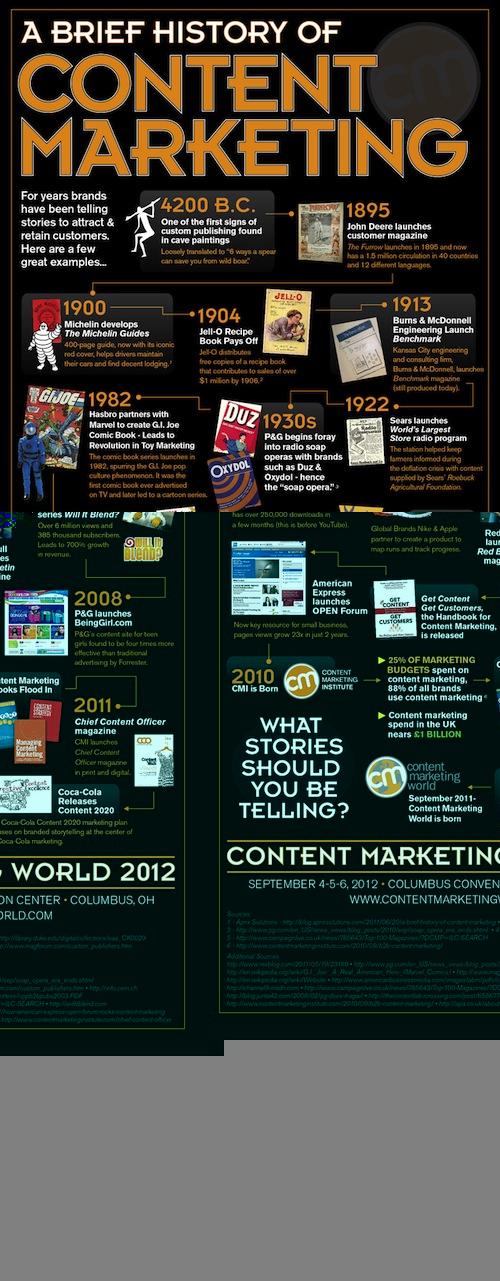 Content marketing is the buzzword of the moment, but in reality, it’s a marketing concept that’s been around for decades—heck, even longer than that.
Content marketing is the buzzword of the moment, but in reality, it’s a marketing concept that’s been around for decades—heck, even longer than that.
And when you think about it, that’s not surprising. After all, the technology and devices with which we produce and consume content have drastically changed, but words and stories are nothing new. What’s changed is the mediums and the tactics that we employ to tell those stories.
A Brief History of Content Marketing
Early examples of content marketing include Jell-O’s recipe book in 1904, Sears’ World’s Largest Store radio program in 1922 and P&G’s radio soap operas in the 1930s. These and an array of other examples are included in a history of content marketing infographic produced by Content Marketing World.
As we mentioned earlier, content marketing has undergone an impressive evolution thanks to a rapidly changing technology landscape. Yet the bottom line of content marketing hasn’t changed: it’s brand storytelling. And that’s a concept that’s been around for a long time.
Instead of broadcasting brand stories on radio programs or on TV, or publishing them in recipe books, newspapers and magazines, today’s content producers are focusing on digital storytelling as an integral part of corporate marketing communications, not to mention a critical element of a brand’s digital marketing strategy.
The Elements of Content Marketing Success
Whether you’re just beginning to forge your own content marketing path or are considering refining your existing strategy, the good news is that content marketing, as a concept, is simple.
The first, and most important step, is to ask yourself what information is relevant, entertaining, informative or provides a resource to the clients and industries you serve. Identifying these content categories will not only help you generate ideas, but also demonstrate that you know your audience and the types of content to produce that will bring value to these readers.
Once you’ve completed the initial idea generation, your job is to produce content that fits those guidelines. This is also an important time to examine your business from the inside out and ask yourself what stories you should be telling about your own brand. This likely involves stepping outside of your current department. Get to know the faces of your brand or company and have these employees become involved in the content creation process.
That’s where the critical concept of brand storytelling comes into play. Content marketing isn’t only an important method with which to deliver information to your audience—it also represents an ideal opportunity to humanize your brand. And it doesn’t matter what industry you’re in – or whether you’re in marketing or PR. The key is to put a face to those who make up your organization—showcase their expertise, share their triumphs and illustrate the resources, expertise and thought leadership they bring to the table.
When you do that, you give your audience an inside look at your brand—and that’s powerful motivation for them to continually come back to consume your content. After all, publishing content is an important step—but if no one reads it, the strategy behind your words is lost.
Has your company been producing content long before content marketing became this year’s buzzword? If so, what? And what are you focusing on in the future? We agree with David Meerman Scott about the importance of real time content development and publication—and that takes content marketing to a whole different level.
Oh, and by the way, if you’re not yet focused on producing relevant content as part of your search engine marketing strategy, with Google’s impending algorithm changes, you might want to start.
Image by rfranklinaz via Creative Commons
